
Transcription
A Mindful Approach to Prison Reform
by Daniel Labbe
There is a lot of talk about creating a prison system that is more focused on educating and rehabilitating those that live within its walls. Having spent the last ten years of my life in prison and having been fortunate enough to have the necessary support and resources to transform my life for the better, I've spent countless hours thinking about what a rehabilitation focused prison would be like. From my own experience with successfully working through the issues that led to my incarceration, participating in available D.O.C. programs, and observing my fellow inmates, I have a few ideas of my own about the ideal prison and how it would run.
The first step must be to replace the criminal justice system with a restorative justice system. Such a system would define justice as victim restoration and offender rehabilitation. It would also place greater emphasis on supporting those recently released into our communities to ensure a more successful reintegration. In my ideal prison system each state would designate at least one prison as a rehabilitation and restoration center. The goal of these facilities would be to educate, train, and empower their residents so they can lead lives that reflect their unique core values, strengths, and talents in a way that contributes to the health and well-being of their families and communities.
On the day of their sentencing, first time felony offenders are given the option of going to the "RRC" to participate in the one to two year program. Upon completion of the program first time offenders will have their sentences reduced by 1/3. Second time felony offenders are given the option to go to the RRC but will not receive a sentence reduction if they have already been through the program. Offenders can not participate in the RRC program if they have gone through it twice already.
Those serving natural life sentences and have graduated the program have the chance to remain at the RRC as an inmate facilitator for a period of time (maybe rotate lifers on a 2 year cycle).
So what kind of program would the RRC use? Luckily there is an abundance of research about which kind of programs work well with at-risk populations and reducing recidivism. You guessed it: Midfulness-based programs, especially those that include emotional intelligence and cognitive training. These programs have been well researched by the medical community and the results are amazing. Fleet Maul (formerly incarcerated for 15 years) and Kate Crisp have created such a program that is receiving national acclaim: The Path of Freedom (featured in August, 2013 issue of Mindful magazine). The Mind-Body Awareness project has also had great success with its program taught to a variety of at-risk populations. These programs typically include the following core lessons:
- Mindfulness and meditation
- Impulse control/distress tolerance
- Emotional Intelligence/Emotion Regulation
- Empathy and compassion
- Personal responsibility/Accountability
- Transforming negative core beliefs
- Cognitive therapy
- Interpersonal skills/conflict resolution
- Forgiveness
- Basic goodness/Self-discovery
Such programs are often taught over an 8-12 week period, but at the RRC we would include educational and vocational training and stretch the program over a one to two year period, depending on the needs of the resident.
Programs like these are being offered in a wide variety of settings today because of the amazing results they produce. Chade-Meng Tan, an engineer at Google, created and offered a similar program tailored to the corporate enviroment in 2007. It was so successful and created such positive results for Google as a corporation and its employees that dozens of major corporations now offer similar programs (Ford Motor Company, Facebook, Twitter, Target, Harvard Pilgrim Health - just to name a few). Hundreds of schools now teach similar programs in K-12. Hopsitals in every major city offer similar programs. Why are these programs becoming so popular? It's simple: they consistently create life changing results. To find out more on the abundance of research backing these programs up visit mindful.org.
There is one problem. As an inmate I know that no matter how great the program it will have little affect on inmates if they are not properly prepared and motivated. The average offender has a long history of drug and alcohol abuse, mental health issues, and he's often been raised in poverty and in abusive, dysfunctional homes. Years of such a life force people to create strong defense mechanisms and survival skills that are not conducive to a healthy life such as being manipulative, identifying with anti-social, pro-criminal lifestyle and believes, an inability to experience empathy, control through anger and violence, and so on. The ego structure that supports these habits is so strong that hardly anyone can just CHOOSE to let it go. It's who you ARE and you don't even realize that your beliefs and manipulative coping skills are a problem. You see them as NORMAL and NECESSARY.
The fact is, this is true for everyone, only most people's manipulative coping skills are not so dysfunctional that they end them up in prison (think over-eating, over working, the "control freak," co-dependence, and so on). The military developed boot-camp to break down this ego structure and build up a new one to fit its needs. Prisons tried the boot-camp approach - break them down and build them up, but it didn't work well.
Luckily there is a MINDFUL way of helping a person see the manipulative part of their ego structure: A TEN DAY INTENSIVE MEDITATION RETREAT. Sounds TOO far out, doesn't it? But such a retreat has been held in multiple MAXIMUM security prisons with great success. One such prison is in Alabama. Over twenty men attended the first retreat. These were the most serious offenders in Alabama and guess what? Most of them successfully completed the retreat and experienced remarkable personal transformations as a result. It was so amazing, a documentary and a book were created about it. Both are named 'Dhamma Brothers'. Check it out for yourself.
Why would a ten day intensive meditation be so helpful? During such retreats you are meditating for over eight hours each day (walking, sitting, and body scan meditations). As emotionally wounded people, many of us formerly addicted to drugs and alcohol, we do not tolerate emotions and impulses well. We react to them in all sorts of destructive ways and have become so good at surpressing certain ones that we've forgotten all about them. Also, we can't see our own patterns for what they are. Intensive meditation forces us to sit through all kinds of emotions and impulses to react to them. We also get a real good look at our thought patterns, and there's no escaping it.
Often times meditators come up against serious emotional wounds and it can be overwhelming. At such times it is the role of the facilitator to compassionately listen to the meditator talk about what he (she) experienced, then to encourage him back to his meditation seat, assuring him that he is doing well and that this is exactly what's supposed to happen.
For some participants, it may prove too much at first. For such people they can leave the retreat, engage in some intensive counseling, then try the retreat again later, maybe after 30-60 days of counseling and preperation. ALL participants will be STRONGLY encouraged to complete the ten-day retreat, and most will be able to (as shown by the many prison retreats that have already happened). The few that can't make it through a second try at the retreat can participate in the rest of the program if they show they are sufficiently motivated.
The retreat, the cirriculum I described earlier, educational and vocational training, and assistance in returning to society would make a great rehabilitation program as long as the RRC promotes a healing and resident-affirming environment rather than a punitive environment. These offenders are engaging in the best possible course of action - the work of healing and empowering themselves to lead healthy lives. Let's support such efforts rather than sabotage it by treating them as rabid animals like the current system does.
[The now infamous A.L.E.C. group promotes longer sentences and less programs for inmates to increase recidivism and inmate populations in hopes of forcing states to create more privately owned prisons.]
Remember: MOST inmates have a release date. Over 700,000 people are released from jails and prisons every year. Who would you rather have move into your neighborhood? A person who spent the last 5 or 10 years being treated like an animal in a hateful, violent, and abusive environment adding to his rage and hatred or someone who has gone through the RRC program? There are no guarantees of success, but I am confident about which choice you would make.
There would be a lot of details to work out, of course. My intention here is to show that it wouldn't be too hard to figure out how to create a justice system that significantly reduces recidivism rates. So if it isn't all that hard to do ask yourselves this: what interest does the D.O.C. and state politicans have in NOT creating such a system? (Hint: $$$)
If this article interested you leave a comment and email it to your friends or anyone of interest.
To find out more about mindfulness programs that incorporate emotional intelligence check out these web site:
siybook.com
prisonmindfulness.org
mindful.org
mbaproject.org
If an inamte with a 10th grade education can figure it out, what's stopping THEM?

Other posts by this author
|
2016 aug 4

|
2016 jun 25

|
2016 jun 9

|
2016 may 5

|
2016 mar 11
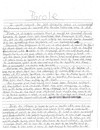
|
2016 feb 7

|
More... |

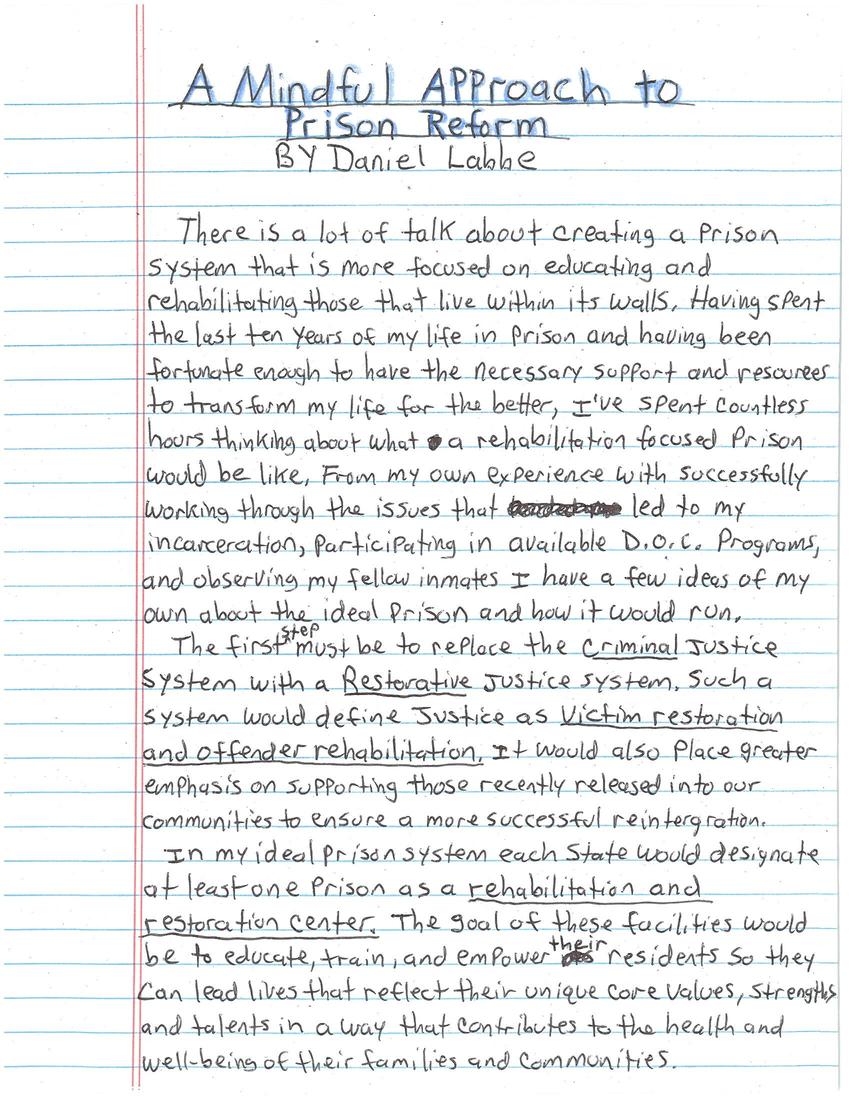
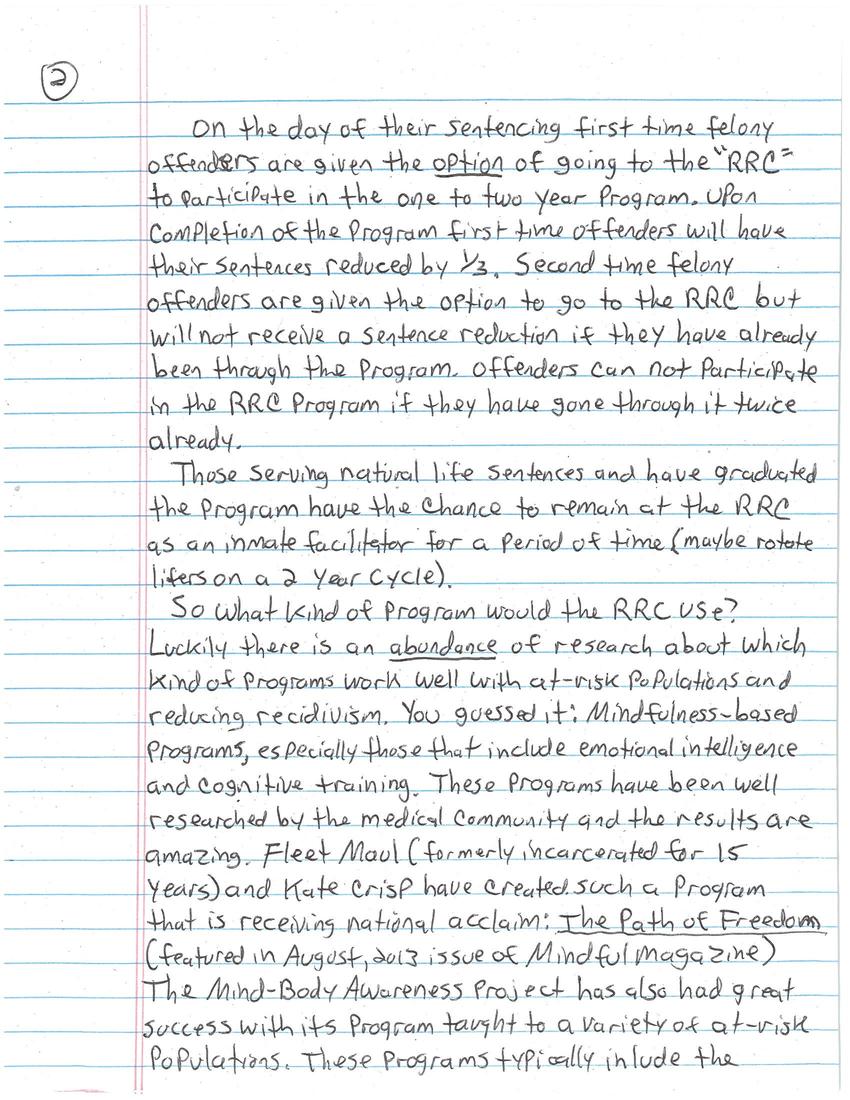
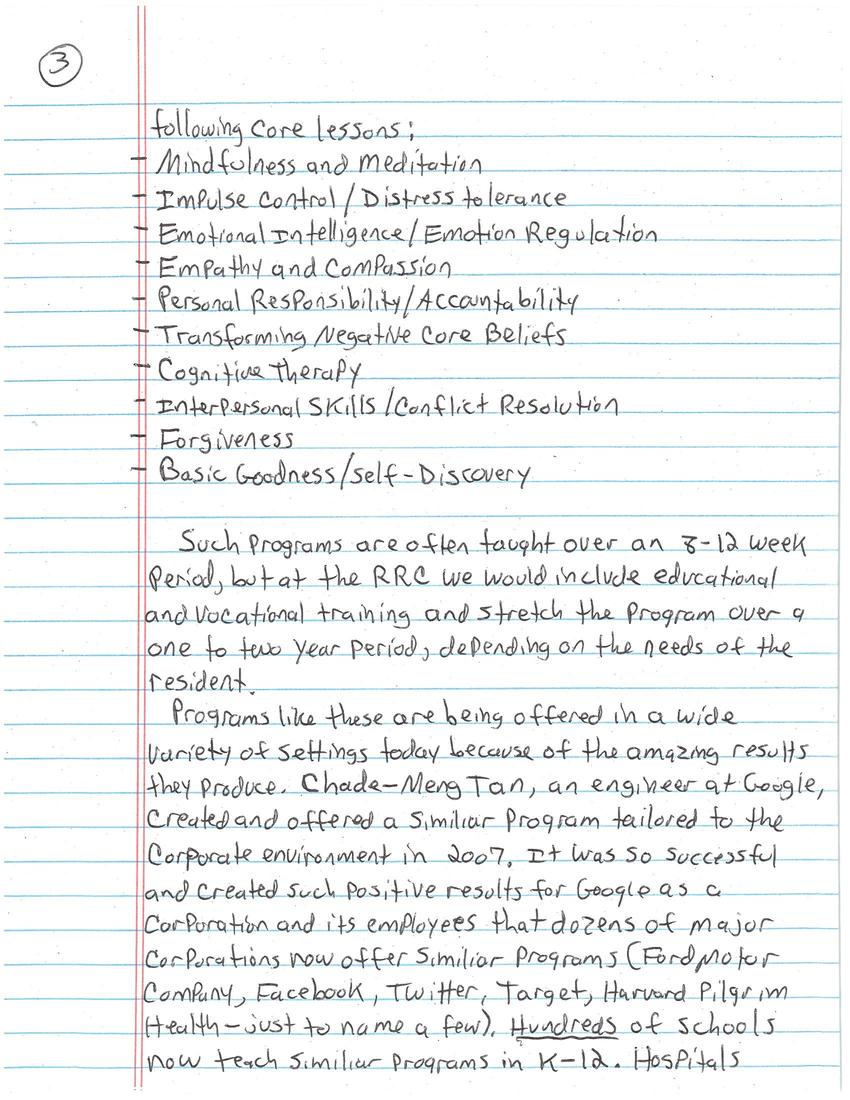
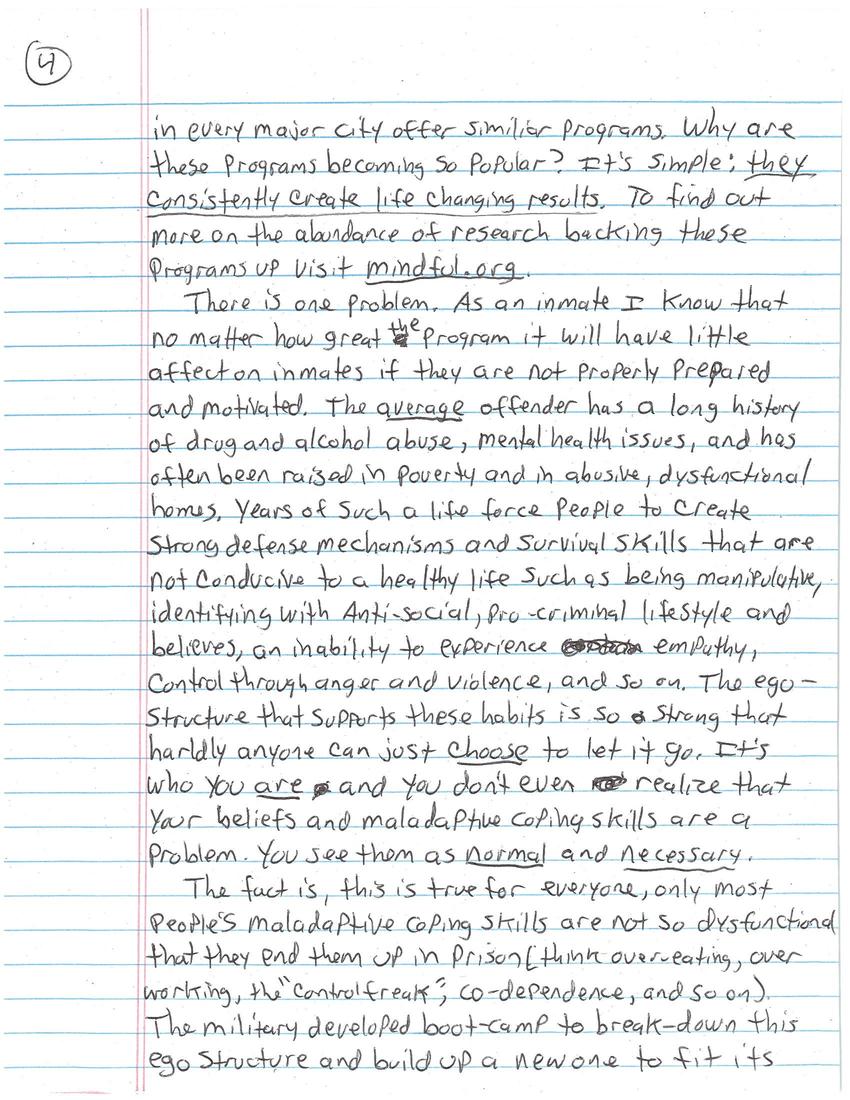
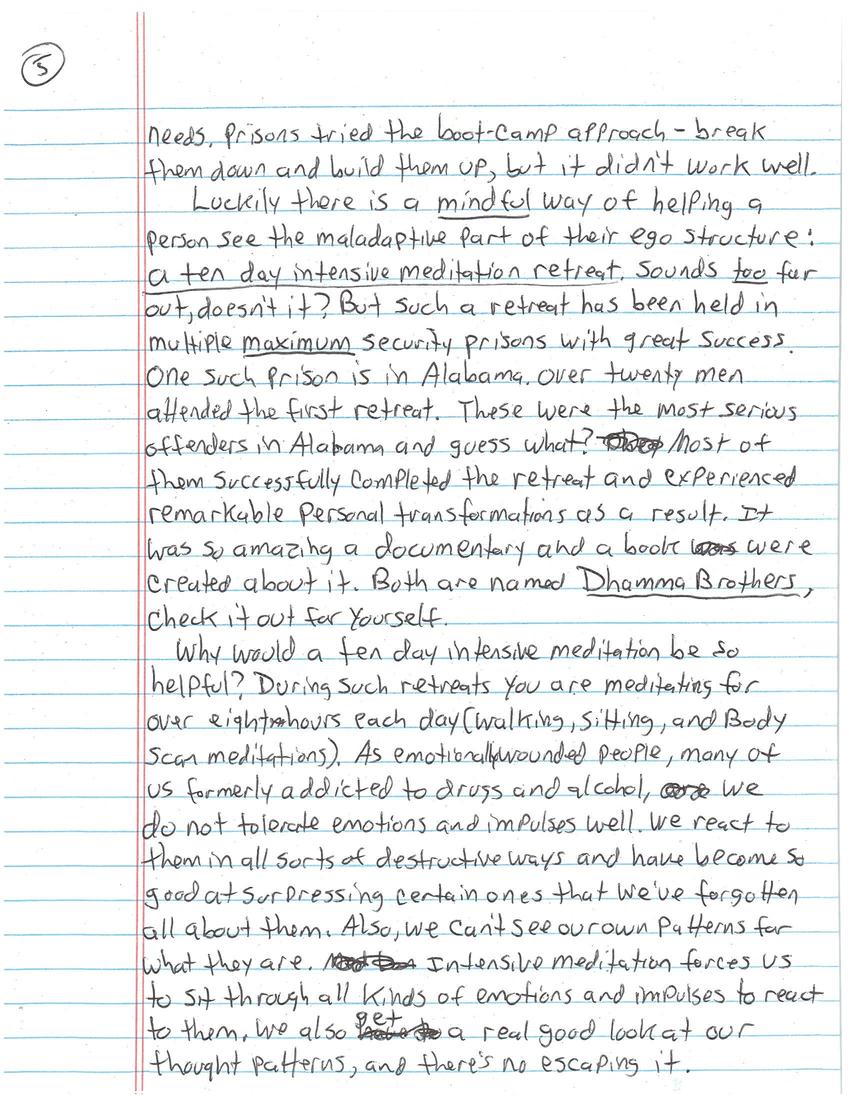
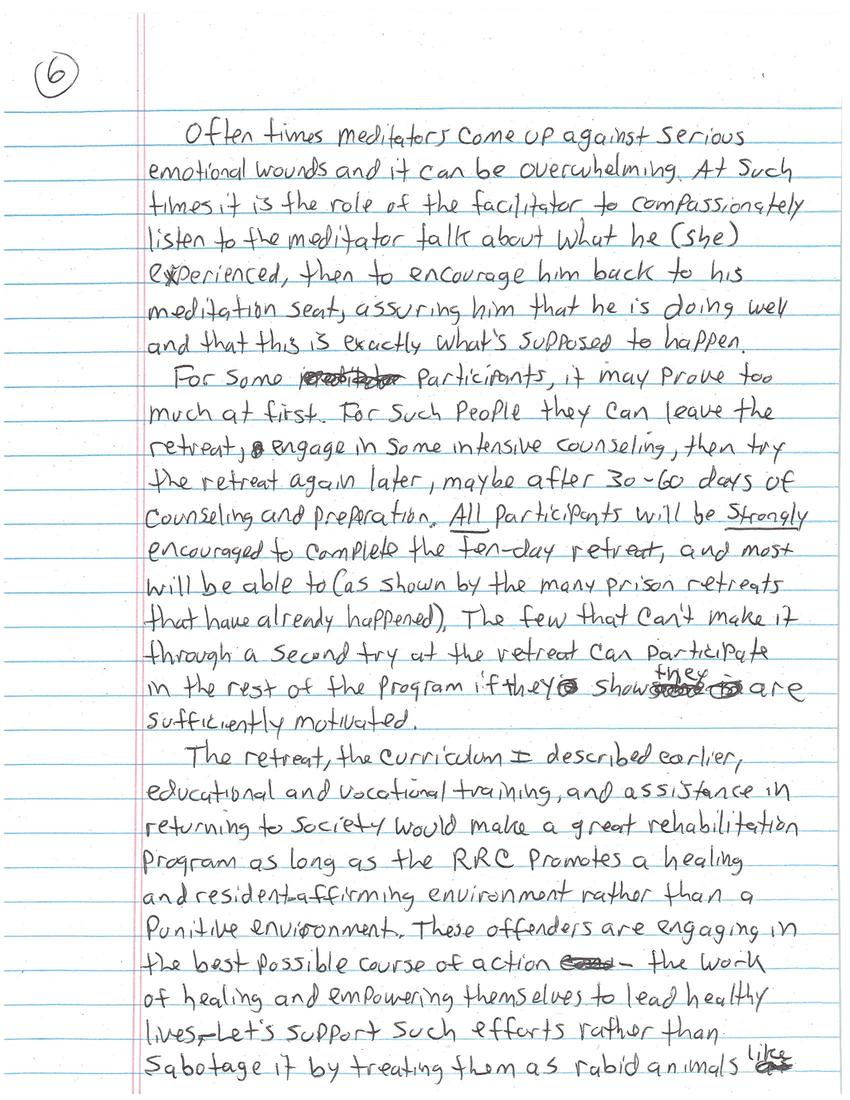
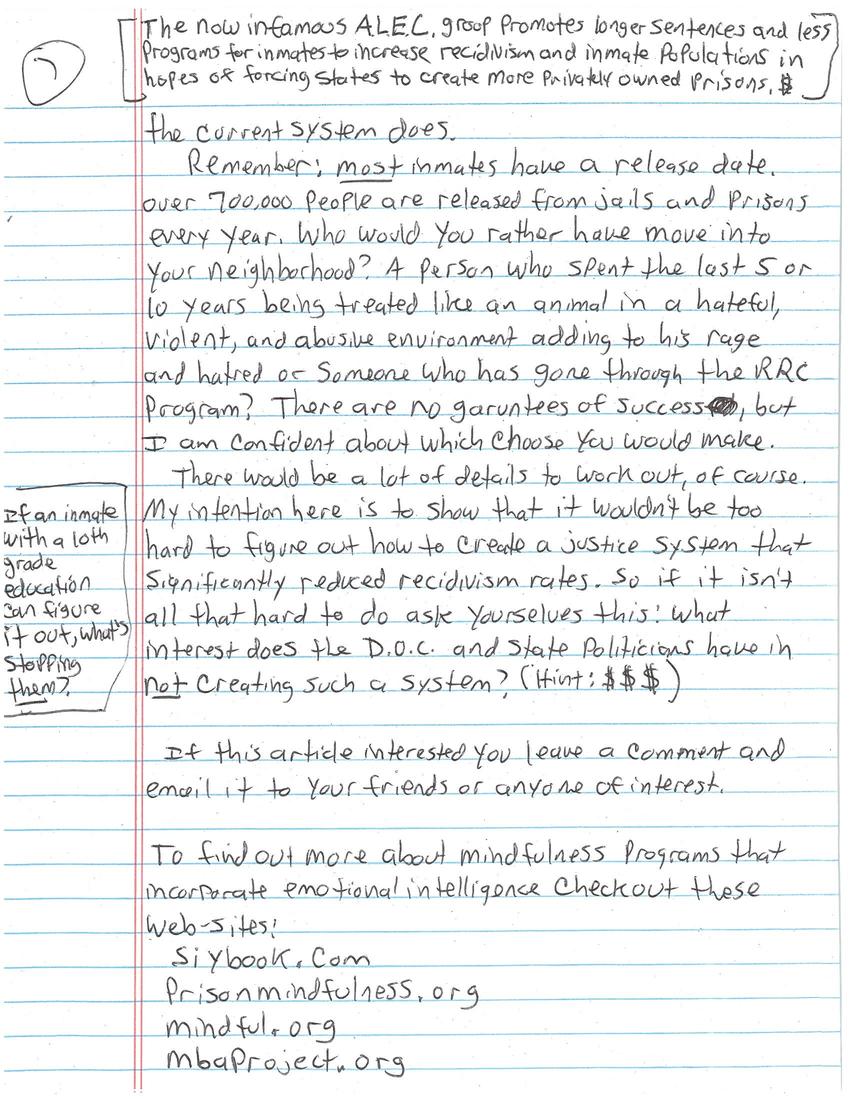

Replies (26)
Excellent article!! I would never have guessed that you have a 10th grade education. This was very well written and an excellent idea. You should try to get the article published!
Thank you for this thoughtful and well researched article. I cried when I read it, especially your definition of a "restorative justice system". I am the mother of a victim of a crime and I have struggled to come to terms with whether I will ever feel like justice has been served for the perpetrator of this crime. You have helped me realize that more than punishment for him, I just want to be absolutely certain that nobody else will be hurt in this same way by him or anyone else. I want desperately to save other mothers and daughters from this pain. What I really want to believe in is what you described, a system that can truly rehabilitate. The difficulty is that most people believe that adult offenders can't be truly rehabilitated. I looked up the programs you wrote about and I think you might be onto something. Thank you for giving me hope that most people might be wrong.
http://www.indiegogo.com/projects/inmates-who-have-no-one/x/4522850
I've run a Buddhist program in the past :).
First off, an excellent post! Very poignant and well-written. I fully agree with your emphasis on "restoration" rather than "punishment," especially with regards to the practice of mindfulness. It has worked wonders in my own life, and I have no doubt that it can greatly help inmates as well. What a shame that our government refuses to fund such programs. Sadly, they seem to view all inmates as beyond repair, which is just plain wrong.
Hope you are well. Stay strong!
Sincerely,
Vladimir
P.S.--are you allowed to receive books in the mail? If you'd like, I would be glad to send you some reading material.
I just finished reading your article entitled "A Mindful Approach to Prison Reform". Consider my mind opened. It was a truly insightful article, and your ideas on how to better rehabilitate prisoners are very well-thought-out.
I think you have pinpointed the problem in our criminal justice system today, which is the fact that we spend far too much time worrying about getting offenders into prison, and very little time at all thinking about what happens to them when they get out. People who have, as you say, been treated like "rabid animals" will have an incredibly hard time becoming a part of society outside prison again.
I must admit that I found myself a little doubtful about how much a ten day intensive meditation retreat would really help people who have (perhaps for more than twenty years) been trapped in the current prison system, and confined like animals...
But I did some more research on The Dhamma Brothers, and I was shocked that I had never heard about it before. The program really does seem to work, and most importantly, work WELL. A program with such beneficial results should, I think, be the norm in prisons all over the US. Reading through some of the letters of prisoners who had undergone the program, I was absolutely astounded at the results that it seems to have. Here's one quote from Willie Carroll that particularly struck me:
"I can now talk to the worse of attitudes and still keep my composure—I can now be human to myself and others. I’m not cured of my lack of knowledge but this experience has allowed me room to grow and to respect my growth."
Thanks for the insightful article, and keep writing -- if anything can get these ideas spread, it's through Between the Bars.
Best wishes,
--C.B.B. (candleships)
I just read an article from the Onion and thought of you and your posts. Hopefully the satire will help spark some minds!
http://www.theonion.com/articles/15-years-in-environment-of-constant-fear-somehow-f,35434/
15 Years In Environment Of Constant Fear Somehow Fails To Rehabilitate Prisoner
NEWS IN BRIEF • Prison • Lifestyle • ISSUE 50•09 • Mar 4, 2014
WOODBOURNE, NY—Reportedly left dumbfounded by the news that recent parolee Terry Raney had been reincarcerated on charges of assault and battery, officials at Woodbourne Correctional Facility struggled Tuesday to make sense of how the prisoner had not been rehabilitated by 15 years of constant threats, physical abuse, and periodic isolation. “It just doesn’t seem possible that an inmate could live for a decade and a half in a completely dehumanizing environment in which violent felons were constantly on the verge of attacking or even killing him and not emerge an emotionally stable, productive member of society,” said chief warden Albert Gunderson, who noted that, as hard as it was to believe, Raney’s recidivism proved that his criminal impulses had not in fact been corrected by the sense of grave distrust he felt toward every other person in the facility, including both fellow inmates and prison authorities, every day since 1999. “We surrounded him with a combustible mix of rival gangs and made sure that he was consumed by a round-the-clock sense of terror that the slightest misstep on his part could result in a sharpened piece of scrap metal being shoved into his neck, and yet he still leaves this facility with the same criminal thoughts and violent mindset as before? I’m truly at a loss for how this could have happened.” Gunderson then noted his additional confusion at how the man’s criminal record and the social stigma of his prison sentence had somehow failed to land him a steady job immediately upon his release.
Yours in the struggle,
Jessica Lopez &
Ban Reverse Stings
This was fantastic to read, for so many reasons. It is individuals like you who have motivated me to work toward the position I'm currently in - doing a PhD at the University of California, Irvine in Criminology, Law & Society. I taught Philosophy and Ethics for the Prison University Project at San Quentin, and saw the tremendous need for exactly the kind of approach you suggest. I'm working on developing a research proposal for implementing a large number of the policies and practices of offender treatment and social attitudes from the Nordic countries. My contention so far has been that the unit of focus for rehabilitation needs to expand beyond the individual inmate, and also encompass the local communities into which they are released. The public imagination needs to be rehabilitated too. I would love to hear more of your thoughts and ideas about how this might happen. I feel the perspective of inmates is invaluable in this endeavor.
Love and strength to you,
Marina
Your insight on this topic was fantastic to read. I couldn't help feeling like this may be a calling for you. I am confident that someone like yourself, who has the knowledge, background and positive mindset to make a change in this world......will. I also know that there would be many people willing to support you and cheer you on.
I wish you the very best of luck.
Justina.
Too often you hear reasons of why or why not change in the system cannot occur coming from higher authorities, but I think it is refreshing to hear your thoughts since you are going through this first hand.
What is the purpose of the Prison? Is it to punish? Is it to reform? As my knowledge continues to increase, I began to form an opinion that agrees with your position. A restorative justice system is needed. Your goals for an ideal system are great and go along completely with my morals and thoughts about the prison.
This RRC program sounds fascinating, and I would be interested to see how many inmates would choose to participate in this facility. Also, I would be interested to see how many people would be willing to participate in the ten-day retreat you described. You touched on the point that many people coming into the prison are not really in a good state of mind, but I do believe through a system like this people would be willing to change. You described how if you are a first time offender you can get a sentence reduction by 1/3; a second time offender will not receive a sentence deduction, but can still participate in the program; and those who have participated in the program twice already are not able to go through it again. This is a very smart and well thought out idea. I feel for first time offenders it is almost like an incentive to get a sentence reduction. And during their time there, hopefully they will have a change of mind for the better. Also, those that are second time offenders are still given the privilege—like a second chance. While it might of not worked completely the first time, if they are willing to go back to the program without the incentive of a sentence reduction, this shows that they are motivated, and they do want to see a change within themselves. Lastly, the third time offender is not given the opportunity to participate in the program. It is like the idea of ‘three strikes and you are out’; you were given the opportunity to reform, but you did not take advantage of it therefore you missed your chances—it is a missed opportunity.
The lessons you are envisioning for this RRC program such as ‘self-discovery’ and ‘interpersonal skills/conflict resolution’ is exactly what the prison needs. Moreover, the question you proposed at the end really brought your idea full circle. Do you want to have a criminal in your neighborhood that did not undergo reform? Or one that has gone through this RRC program and has reformed and has had a change of mind? People say they have this WANT for reform of prison inmates, but do slim to nothing about it. However, with an idea like this brought to the table, people will agree and feel a passion to take action.
I encourage EVERYONE to forward/share this blogpost of yours. Let's start working.
*thumbs-up*
Your post is a tremendous call not only for a completely reconceived idea of justice, but for a society that views those who it has failed as human, rather than animals or sources of profit. Keep up the good fight.
Your writing here is so thoughtful. Justice focused only the past cannot lead to a future. I love the way you've articulated these very specific items but also shared a bigger theme and idea. So well said. Stay strong!
This is an incredibly well written and thoughtful post. I think you are the type of person who could be the leader in revolutionizing our system, which is clearly NOT working. Keep it up, and stay strong!
Sincerely,
Caroline
There is no money involved, but i can send you a few copies o;f the book.
I'm someone who really believes in restorative justice and your post helped me learn how important it is to treat everybody as a human being.
I hope to be a public defender in the future, and your post is one of the reasons why I want to work on the behalf of prisoners. I don't believe excessive punishment and retributive justice does anyone any good and the focus on getting people in prisons neglects to think about the effects of after prison and during prison.
I hope humanity can go on a closer step towards restorative justice and work on remembering the humanity in everyone. Thank you for writing.